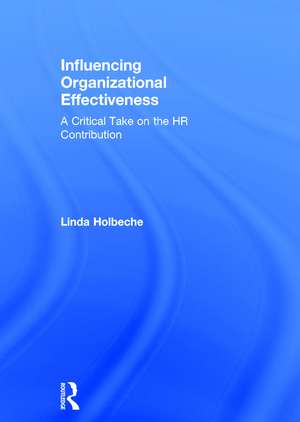Influencing Organizational Effectiveness: A Critical Take on the HR Contribution
Autor Linda Holbecheen Limba Engleză Hardback – 12 dec 2016
Influencing Organizational Effectiveness challenges mainstream thinking around business strategy, change and organizational effectiveness, and about the roles of HRM and management. While the overall tone of the book is critical, Holbeche argues that HRM can play an active role in giving voice to employees and advancing organizational effectiveness.
Grounded in research, this book includes reflective questions, case studies and helpful guidelines to support HRM and organizational development professionals and master's-level students. It illustrates what ‘better’ might look like and how HRM can contribute to a new definition of effectiveness which is aligned to the needs of modern organizations.
| Toate formatele și edițiile | Preț | Express |
|---|---|---|
| Paperback (1) | 476.08 lei 6-8 săpt. | |
| Taylor & Francis – 20 dec 2016 | 476.08 lei 6-8 săpt. | |
| Hardback (1) | 992.21 lei 6-8 săpt. | |
| Taylor & Francis – 12 dec 2016 | 992.21 lei 6-8 săpt. |
Preț: 992.21 lei
Preț vechi: 1331.99 lei
-26% Nou
Puncte Express: 1488
Preț estimativ în valută:
189.92€ • 206.36$ • 159.64£
189.92€ • 206.36$ • 159.64£
Carte tipărită la comandă
Livrare economică 21 aprilie-05 mai
Preluare comenzi: 021 569.72.76
Specificații
ISBN-13: 9780415740081
ISBN-10: 0415740088
Pagini: 356
Ilustrații: 26
Dimensiuni: 174 x 246 mm
Greutate: 0.75 kg
Ediția:1
Editura: Taylor & Francis
Colecția Routledge
Locul publicării:Oxford, United Kingdom
ISBN-10: 0415740088
Pagini: 356
Ilustrații: 26
Dimensiuni: 174 x 246 mm
Greutate: 0.75 kg
Ediția:1
Editura: Taylor & Francis
Colecția Routledge
Locul publicării:Oxford, United Kingdom
Public țintă
Postgraduate and UndergraduateCuprins
Section One: Context
1. Introduction
2. Key Concepts and Theories
3. A Neo-Liberal Landscape
4. The New Work Culture
Section Two: managerialism and HRM
5. The HRM ‘Project’
6. The Shaping of Subjectivities
7. The Conflicted Practitioner?
Section Three: The impact of the work culture on employees
8. The Emerging Psychological Contract
9. The Search for Meaning
Section Four: Phoenix out of the ashes?
10. The Crisis of Capitalism
11. New Organisational Effectiveness (OE)
Section Five: HR influencing organisational effectiveness
12. HR and OE
13. Performance Management
14. OD and Change
15. Conclusion
16. References
1. Introduction
2. Key Concepts and Theories
3. A Neo-Liberal Landscape
4. The New Work Culture
Section Two: managerialism and HRM
5. The HRM ‘Project’
6. The Shaping of Subjectivities
7. The Conflicted Practitioner?
Section Three: The impact of the work culture on employees
8. The Emerging Psychological Contract
9. The Search for Meaning
Section Four: Phoenix out of the ashes?
10. The Crisis of Capitalism
11. New Organisational Effectiveness (OE)
Section Five: HR influencing organisational effectiveness
12. HR and OE
13. Performance Management
14. OD and Change
15. Conclusion
16. References
Recenzii
'With her uniquely engaging, pragmatic and convincing approach, Linda’s thoughtful and thought-provoking new work provides us with an invaluable overview of and critical insights into, the way in which the world of work in the UK has evolved over time.' - Michael Jenkins, Chief Executive, Roffey Park Institute, UK and Singapore
'This book unravels the damaging effects of the "new work culture" and HRM practices, showing how they are counter-productive to healthy work and working lives. The outcome is a new HR approach based on more ethical and sustainable organizational practices.' - Professor Colin C. Williams, University of Sheffield, UK
'This book unravels the damaging effects of the "new work culture" and HRM practices, showing how they are counter-productive to healthy work and working lives. The outcome is a new HR approach based on more ethical and sustainable organizational practices.' - Professor Colin C. Williams, University of Sheffield, UK
Descriere
Influencing Organizational Effectiveness goes beyond criticism to advocate better practice. Grounded in research, the book will include reflective activities, case studies and helpful guidelines for the various readership constituencies, including students and practitioners, managers and employees more generally. It will illustrate what ‘better’ might look like and how, working separately and together, we can help create truly effective organisations.

